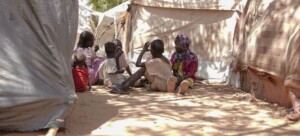Sudanese form ‘cholera aid teams’ as govt. remains silent
As the Sudanese government is still silent about the cholera epidemic hitting many parts of the country, people are setting-up aid teams. Some hospitals in Khartoum reportedly refused to admit patients.
As the Sudanese government is still silent about the cholera epidemic hitting many parts of the country, people are setting-up teams to list and help patients. A number of hospitals in Khartoum reportedly refused to admit people suffering from the infectious disease.
On Sunday, Sudan’s Communist Party announced the formation of a “national committee” to combat the cholera epidemic.
At a press conference in Khartoum, Dr Amaal Jabrallah, Member of the Communist Party’s Central Committee, said the government must be pressured to take its responsibility and declare “a cholera epidemic”.
She mocked the government's insistence on calling the disease “watery diarrhoea” and considered the refusal of some hospitals in Khartoum to admit patients “legally unacceptable”. Denying the existence of the disease and at the same time refusing patients is a big shame, she said.
“Combating cholera requires political will from the government and the opposition. Apart from increasing the health budget, the state must officially declare a cholera epidemic in order to receive aid from abroad.
“It is impossible to combat cholera if the problem of contaminated drinking water is not resolved,” she added.
Cholera is a fast-developing, highly contagious infection that can spread in areas short of clean drinking water and with poor sanitation. In September last year Radio Dabanga received the first reports about cholera cases, in Blue Nile state. Since then, the disease spread in eastern Sudan, and later to the Northern State and central Sudan’s El Gezira. In April, sources in White Nile state reported a rapid spread of cholera. The disease then spread to North Kordofan and fully hit Khartoum in May.
Federal Health Minister Bahar Idris Abugarda told the parliament on Thursday that between August 2016 and May 2017 the Ministry recorded 14,659 people infected with “watery diarrhoea”. 292 patients died.
‘Strategic action’
Medical doctor Sayed Ganat also condemned the refusal of some hospitals in the Sudanese capital to admit cholera patients, including the prominent Yastabshiroun Hospital.
“No hospital has the right to choose the type of patients it receives. Rejecting patients is a violation of the Medical Council's rules and regulations and the Sudanese medical professional mores,” he told Radio Dabanga on Sunday.
Ganat further criticised the federal Minister of Health, “the first official who has the authority to decide on a declaration of epidemics”, for his prolonged silence.
On Sunday, First Vice-President and the Prime Minister Lt. Gen. Bakri Hassan Salih called on the Ministries of Health and Finance and the Governor of the White Nile state “to urgently deal with the watery diarrhoea epidemic”.
Bahr Idris Abugarda, the federal Health Minister told reporters before meeting with the first vice-president in Khartoum that “This issue requires integrated strategic action which includes environmental sanitation and water stations to provide clean drinking water.”
Aid committees
Dr Diaeldin Ahmed Aseen told reporters in Khartoum on Sunday that the National Consensus Forces, a coalition of opposition parties, established the Popular Relief Committee to support cholera patients and their families in the country.
“In the area of Kosti in White Nile state, that is heavily effected by the epidemic, teams of the Popular Relief Committee are providing guidance and medical assistance,” he said. “In particular the people living in El Maraabi, Shabashba, Kater Bela, Kenana and Asalaya need assistance.”
Journalist El Tahir El Doma told Radio Dabanga that the El Gezira Aba Hospital received one case from El Dibeibat. “The clinic in El Maraabi received seven cases. Most of them come from the nearby villages.” He added that the situation in Kosti “seems to be contained”.

In the popular district El Deim in central Khartoum, an Anti-Cholera Committee was formed.
Bushra El Sayem, the Committee’s chairman told reporters in Khartoum on Sunday that 34 people are infected in the district’s blocks 6, 7, and 8.
New patients in northern Sudan as well
A medical source at the Dongola Hospital in Northern State reported that the hospital received many patients from Block 4 of El Birgeig locality.
A resident of El Birgeig said that the infected were transferred to the hospital in Dongola after it was confirmed they had cholera. He added that there were cases reported in Badin Island and other villages as well.
As for Khartoum, Dr El Fateh Ali El Hassan reported 120 new cholera cases over the weekend. In a press conference in Khartoum on Sunday, he said that the Tamayoz Hospital and departments of the Khartoum Teaching Hospital received 48 new cases on Friday and Saturday. Hospitals in Omdurman admitted 20 cases.
In El Obeid, capital of North Kordofan, 168 new patients were recorded. According to sources in Um Rawaba in North Kordofan, four cholera patients died, 60 people turned out to be infected with the disease.
In White Nile state, the hospitals of Kosti and the capital Rabak became “more than overcrowded” after state authorities closed the isolation centres in Asalaya, in Taweela, west of Kosti, and in El Gezira Aba’s Teiba.
“The situation at Rabak Hospital became disastrous after the arrival of so many extra patients. Many have to be treated in the open. The nurses hang intravenous solutions at the trees or the edges of the windows,” civil society activist Abdelrahman El Siddig told Radio Dabanga on Sunday.
He further reported the death of a number of cholera patients in El Gezira Aba and Joda-Kilo-Four, and an increase in cases in El Gezira Aba, especially in the areas of El Maraabi and El Milaha.











 and then
and then